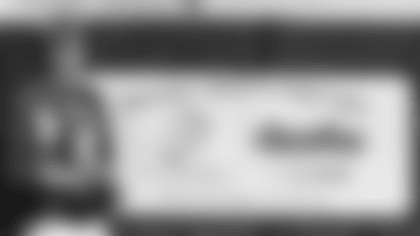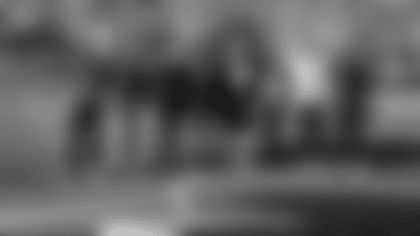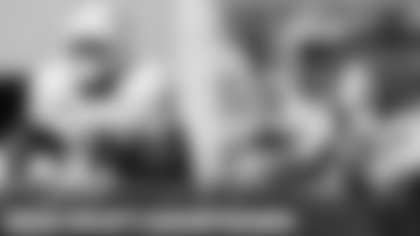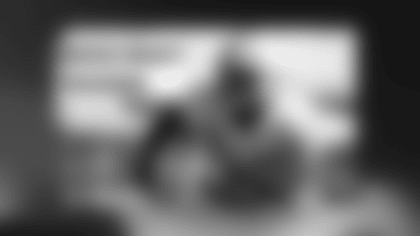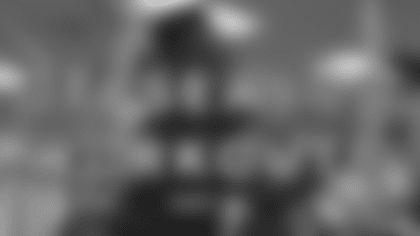[

]()
**Q: Jay, things are going pretty good for you and your ball club, but it's nice to have a defense that plays like that isn't it?**
F: Oh, it is always nice to have a defense like that taking a lot of pressure off of us. It lets us do our thing, run the ball and just be efficient with the passing game.
Q: You have some experience but you haven't played a lot so this is like fresh stuff to you in many ways, really the start of your career in terms of having a job full-time?
F: Sure it is. I feel mentally I'm there it's just sometimes you see things from the sidelines and on film and mentally you know what's going on but until you actually see it live and coming at you, you don't know exactly how that feels. I feel that mentally I'm sharp enough to go out there and handle everything that comes my way. Just being out there and executing under those circumstances gives me experience and more confidence week in and week out.
Q: The assumption is that Ivy Leaguers are always mentally ready to play?
F: I would hope that holds true.
Q: When it came to pass that you were the starter and the dues that you've paid it must have felt good to you that the operation felt that you were the guy and you have some tools to work with?
F: It was a great feeling putting all the work that I've put in to put myself in that situation to compete for a starting job and then getting the nod was a real boost for me and my family and everyone that helped me along the way through the years of high school and college and even the years that I was out of football. You know all the people that still supported me and helped me on my dream.
Q: Talk a little bit about what went in to your decision to go to Dartmouth rather than a football power type school and are there advantages and disadvantages to the Ivy League?
F: The decision was pretty easy for me. I was coming out of high school as a two-sport athlete, football and track, and wanted to pursue both while also getting a great education somewhere. So the Ivy League was a great fit, it was a place where all the coaches I spoke to were happy to allow me to do both football and track. As a quarterback at most of the I-A schools they have extensive spring practices. When I was up in Dartmouth they only had one day of spring practice so it wasn't a big deal to miss that. So the coaches were great, I visited up there and had a great time in Dartmouth and I don't regret that decision at all. As far as advantages and disadvantages, you know the exposure coming out of college, I wasn't getting as much as the higher level I-A teams. So that probably hurt me as far as coming out in the draft and getting a shot early on in my career.
Q: What was the situation in 96-97, you played in the European league but you didn't play in this league for a couple years? What went on in that and how did you handle all that?
F: I started out camp in 96 with Philadelphia and Cincinnati and didn't make it and was sort of hoping for an opportunity to get back at some point that year. I just stayed at home, worked out, stayed in shape, was helping out over at Hofstra University which is near by my home in Long Island. The coaches there were generous enough to allow me to use their facilities and help out where they needed. Then in 97 I went out to the World League, kind of had a disappointing year and didn't play well out there, and because of that did not get a look to come to any camps. But I kept the dream alive. I ended up coaching full-time at Hofstra in 97and was still involved in the game and talking to a lot of the scouts that were coming to look at some players that were coming out of college. All the scouts that I spoke to said I was good enough to play and just needed the opportunity somewhere. And I finally got it in Minnesota.
Q: At what point would you have been sufficiently discouraged to say maybe I need to find a different career?
F: I think if that call from Minnesota didn't come that spring then I would have been done. Being out of the league for two years and not getting another call would have put me on the sidelines for good.
Q: What would you have done?
F: What would I have done? I would have either kept on coaching, staying within the game, or possibly used that Dartmouth degree to get a job somewhere in New York possibly on Wall Street or elsewhere.
Q: Coming into this season what were the expectations by the team in general as to what kind of team you'd have?
F: The expectations are to win, no matter how we get there. I think obviously with Marino being around here for the last seventeen years there were high expectations from the quarterback position. But coming into this year we knew we had a solid defense. We knew we were going to emphasize the running game even though Miami over the past few years has a history of not being able to produce in the running game. We really dedicated ourselves early on to being a hard –nosed running team and taking some pressure off of the quarterback and utilizing a variety of receivers as well. We felt that we were very deep coming into the season, obviously a couple injuries early on has kind of depleted the receiving corps just a little bit. But we still feel we have good guys out there that we can throw to and good running backs coming out of the backfield and some pretty good receiving tight ends as well.
Q: What was your event in track in college?
F: I was a decathelete.
Q: I know you've bounced around but do you still find people ribbing you a little bit about the Ivy League pedigree?
F: No, not at this point. I think I've been around the league long enough to put that out of perspective. I think coming out, that first year there were jokes and ribbing in the locker room but once you establish yourself it doesn't matter where you came from.
Q: You follow a legend, but in a sense it is a new era and the slate is clean for everybody isn't it?
F: We're considering this a whole new ballgame. This is the year 2000, we know that Dan Marino is not here and we're trying to get our own identity as a team. It's not going to be surrounded around one guy, it's going to be a whole team effort. We'll have to rely on the defense to help us out and the defense will have to rely on us at some point to help them out.
Q: You've got Richmond Webb coming back this week?
F: Yeah, I think so, but I don't know any of that information.
Q: When you look at the Patriots are you surprised to see their record at 0-3 right now?
F: Oh, sure they are a solid football team. They've been in every game they've played so far and played some pretty tough teams. Just watching them defensively they have a lot of talent back there. It's easy to see that they could easily be 2-1 or 3-0 with a couple circumstances in those games. We know that we are not facing the stereotypical 0-3 team. We know they're a good football team, they're coming down against a division opponent on the road and they're hungry for a win right now. We're definitely not taking this team lightly.
Q: How good is your defense, they have only given up one touchdown in three games and you guys could be 3-0 easy enough if you got a break against Minnesota?
F: Our defense has been great. You see it in the statistics and we've been seeing it everyday in practice since April. We know we have great talent there and because of that I know that I don't have to force things in on offense. I can play a lot more conservative than I would if we didn't have a great defense and were trailing teams a lot. I know our defense is going to be there to hold some teams down and the key for us on offense is to keep moving the ball, get third down conversions and to not get any turnovers.



